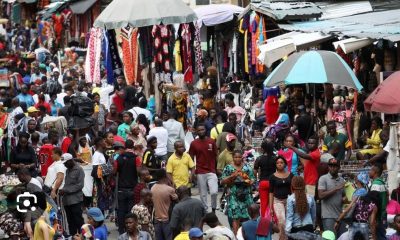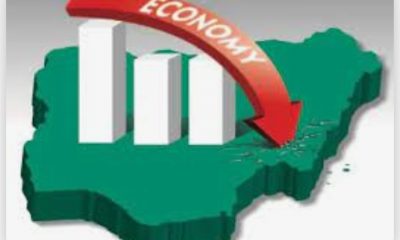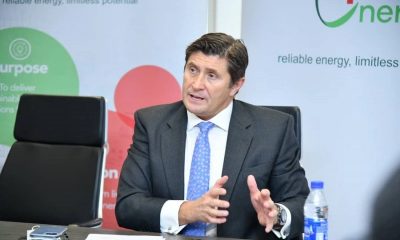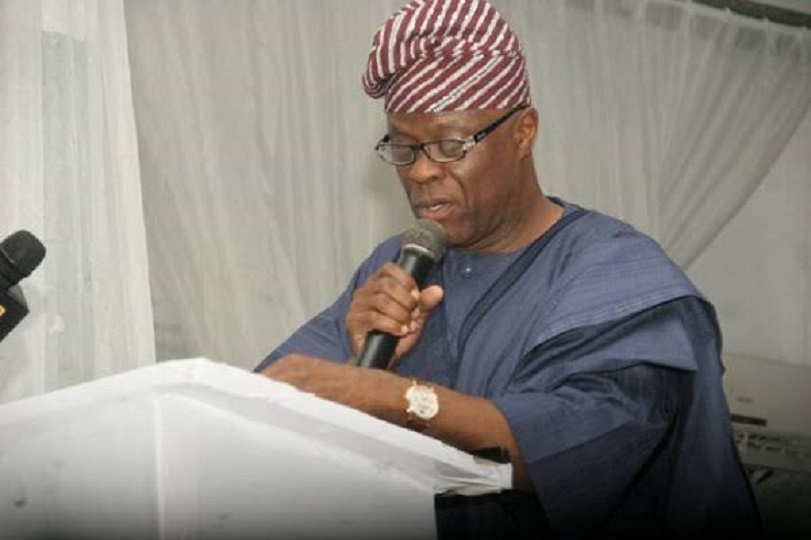Economy
Nigeria’s Economy Grew 3.46% in Q3 2024 With N20.1trn—CBN
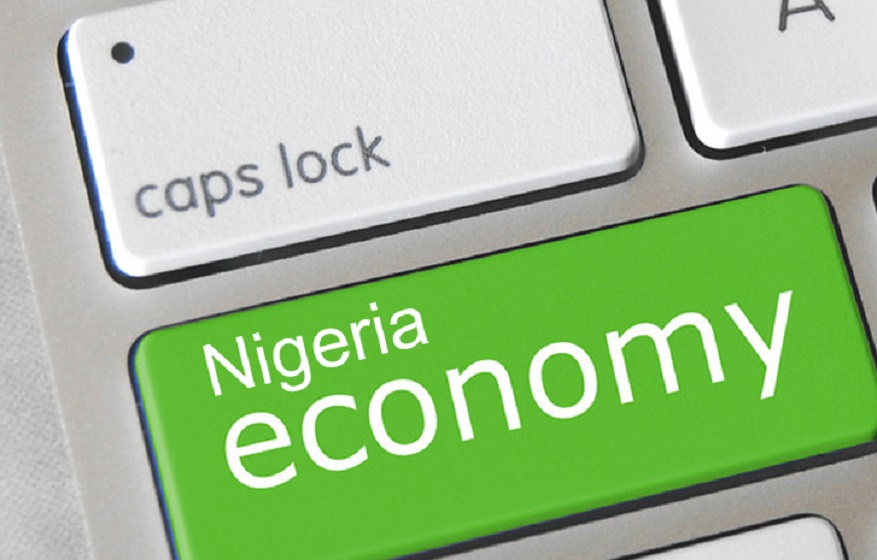
By Adedapo Adesanya
Nigeria’s Gross Domestic Product (GDP), as computed by the Central Bank of Nigeria (CBN), expanded by 3.4 per cent in the third quarter (Q3) of 2024, with output reaching N20.115 trillion, different from the 3.19 per cent growth quoted in Q2 2024 from an output of N18.285 trillion, according to the latest Economic Report for the third quarter of 2024 released by the apex bank.
The CBN said despite persisting headwinds, this growth was driven mainly by the non-oil sector.
The report said inflation moderated during the quarter, reflecting the fall in the food component of the Consumer Price Index (CPI) basket, and driven by the restrictive monetary policy stance.
Domestic crude oil production increased, following enhanced security measures around oil pipeline infrastructure in the Niger Delta region.
The growth of 3.46 per cent recorded in Q32024, represented the third consecutive expansion year-to-date surpassing the 3.19 per cent and 2.54 per cent recorded in Q2 2024 and the corresponding quarter of 2023, respectively.
“Growth was on account of continued efforts to improve the business environment, streamline cumbersome business processes and deepen the quality of business infrastructure,” the report seen by Business Post said.
The 24-month window period opened for the banking sector re-capitalisation (according to their license category and authorisation) supported the robust growth in the services sector, particularly, the finance and insurance sub-sector, the report explained.
The continued drive of the government to improve crude oil production to a target of 2 million barrels per day by year-end of 2024, helped the oil sector to maintain positive growth for the fourth consecutive quarter.
Thus, the oil sector grew by 5.17 per cent (year-on-year) in Q3 2024, compared with a growth of 10.15 per cent in the preceding quarter, and contributed 0.28 percentage points to the overall increase in the period under review.
The performance was slower than the preceding quarter, owing to a drop in prices of Nigeria’s Bonny Light crude in the international market, to $82.07 per barrel from $86.92 per barrel in Q22024.
However, with the increase in crude oil production from 1.27 million barrels per day in Q22024 to 1.33 million barrels per day in Q3 2024.
The non-oil sector growth accelerated to 3.37 per cent in Q32024 compared with a growth rate of 2.80 per cent in the preceding quarter, contributing 3.18 percentage points to total growth.
The expansion of the non-oil sector was driven by the performance of the financial & insurance, information & communication, crop production, trade, transportation & storage, and real estate sub-sectors.
Regarding sectoral performance, CBN said all the sectors, (agriculture, industry and services) grew in Q32024.
The Services sector expanded at the fastest pace by 5.19 per cent in Q32024, compared with 3.79 per cent in Q2 2024 and 3.99 per cent in Q32023, remaining the most dominant sector and accounting for 53.58 per cent of aggregate Gross Domestic Product.
Within the services sector, financial & insurance sub-sector grew by 30.83 per cent, compared with 28.79 and 28.21 per cent in the preceding and corresponding quarters of 2023, respectively. This performance was spurred by gains from the recapitalisation exercise that was announced by the CBN, according to the report.
Other factors such as profits from interest gains (following continued hikes in interest rates), consultancy fees, and ATM & transfer fees contributed to the growth of the sub-sector.
Also, given the financial sector’s ongoing digital transformation (including the significant growth of fintech companies, mobile banking, and digital payment systems), the information and communications subsector grew by 5.92 per cent (contributing 0.95 percentage points to GDP growth).
The performance of the ICT sub-sector was further boosted by the ongoing demand for digital services like e-commerce and data/internet services, which helped to grow economic activity in the other sub-sectors like trade and real estate 0.65 and 0.68 per cent, respectively.
The transport and storage sub-sector grew by 12.15 per cent, compared with contractions of 13.53 and 35.85 per cent in the preceding and corresponding quarters of 2023, respectively.
The growth was driven by the increase in road transport owing to improved security conditions and substitution from air transport (due to higher air fares). Also, sustained investments in road infrastructure, as well as investments in alternative sources of energy (CNG) for road transport contributed to the uptick in the sub-sector.
The agriculture sector grew modestly by 1.14 per cent, compared with 1.41 and 1.30 per cent in the preceding and corresponding quarters of 2023, respectively.
The growth was driven by the favourable weather conditions and increased harvests of some staples.
Crop production grew by 1.18 per cent, compared with1.65 per cent in Q22024, while the forestry and livestock sub-sectors grew by 2.23 and 1.03 per cent, respectively, compared with a growth of 2.77 per cent and a contraction of 1.71 per cent in Q22024.
Economy
Lokpobiri Begs Lawmakers to Reschedule Oil Revenue Executive Order Probe

By Adedapo Adesanya
A joint National Assembly probe into President Bola Tinubu’s new oil revenue executive order was stalled on Thursday following a request for more time by the Minister of Petroleum Resources, Mr Heineken Lokpobiri.
The hearing was convened to scrutinise the executive order directing that royalty oil, tax oil, profit oil, profit gas and other revenues due to the Federation under various petroleum contracts be paid directly into the Federation Account.
Mr Lokpobiri told lawmakers that although he attended out of respect for parliament, he had been notified of the hearing only a day earlier and had not obtained all the relevant documents needed to defend the policy adequately.
He appealed for the session to be rescheduled.
Co-chairman of the joint committee and Chairman of the Senate Committee on Gas, Mr Agom Jarigbe, put the request to a voice vote, and lawmakers approved the adjournment.
A new date is expected to be communicated to the minister.
The executive order signed last week also scrapped the 30 per cent Frontier Exploration Fund created under the Petroleum Industry Act (PIA) and discontinued the 30 per cent management fee on profit oil and profit gas previously retained by the Nigerian National Petroleum Company (NNPC) Limited.
Anchored on Sections 5 and 44(3) of the Constitution, the presidency said the directive was aimed at safeguarding oil and gas revenues, curbing excessive deductions and restoring the constitutional entitlements of federal, state and local governments to the
However, the order has sparked criticism within the industry, one of which was from the Petroleum and Natural Gas Senior Staff Association of Nigeria (PENGASSAN), whose president, Mr Festus Osifo, called for an immediate withdrawal of the order, warning that it could undermine the PIA and erode investor confidence.
Meanwhile, at another session, the Chairman of the Senate Committee on Finance, Senator Mohammed Sani Musa, disclosed that President Tinubu would soon transmit proposals to amend certain provisions of the PIA to align with current economic realities.
He noted that while many expect the executive order to boost revenue automatically, Nigeria has yet to achieve its desired income levels.
He did not specify which sections of the law would be targeted, but suggested that the drive to enhance revenue generation would necessitate legislative adjustments.
The PIA, signed into law in 2021 by the late ex-President Muhammadu Buhari, overhauled the governance, regulatory and fiscal framework of Nigeria’s oil and gas sector, commercialised the NNPC and restructured revenue-sharing arrangements.
Economy
NGX Group Declares N2 Final Dividend, 1-for-3 Bonus Issue for FY’25

By Aduragbemi Omiyale
Shareholders of Nigerian Exchange (NGX) Group Plc will receive one new share for every three held as of April 10, 2026, as a bonus, according to a proposal from the board.
This is in addition to a final dividend of N2.00 proposed by the board to shareholders for the 2025 fiscal year, which raised the total dividend for the year to N3.00, according to the financial statements of the company filed with NGX Limited.
Last year, NGX Group recorded a sterling performance, with its earnings growing by 36.0 per cent to N22.9 billion from N16.9 billion due to sustained growth across core business segments, improved customer penetration on the back of increased investor activity and rising investor confidence.
The operating profit in the year increased by 44.4 per cent to N11.8 billion, while pre-tax profit jumped to N15.6 billion from N13.6 billion in 2024, with the earnings per share (EPS) at N4.75.
As for its balance sheet, total assets increased to N71.0 billion from N68.0 billion, while shareholders’ equity strengthened to N55.2 billion
The improved debt-to-equity position reflects a conservative capital structure, enhanced solvency profile, and strong retained earnings growth.
“Our 2025 performance demonstrates the resilience of our business model and the effectiveness of disciplined strategic execution. Strong revenue growth, improved operating margins and a strengthened balance sheet reinforce our commitment to delivering sustainable long-term shareholder value.
“The increased dividend and bonus issue reflect the Board’s confidence in the sustainability of our earnings and the robustness of our capital position as we continue to deepen Nigeria’s capital markets.
“We are confident that the momentum that we have built in 2025 will be sustained, given investor confidence in the Nigerian capital market and a pipeline of exciting new listings that will broaden and deepen the market,” the chairman of NGX Group, Mr Umaru Kwairanga, said.
On his part, the chief executive of the organisation, Mr Temi Popoola, said, “We delivered strong top-line growth and enhanced profitability in 2025 despite macroeconomic headwinds.
“Our 36 per cent core revenue growth, improved operating efficiency and successful deleveraging have strengthened our capital base and financial flexibility, supporting the increased dividend and bonus issuance.
“As regulatory standards evolve, including the recent upward review of minimum capital requirements by the Securities and Exchange Commission (SEC), our robust balance sheet positions us to meet new thresholds seamlessly while continuing to invest in liquidity expansion, product innovation and market infrastructure to build a resilient, globally competitive exchange group.”
Economy
FG Targets Credit Access For 50% Workers By 2030

By Adedapo Adesanya
The Vice President, Mr Kashim Shettima, inaugurated the Board of the Nigerian Consumer Credit Corporation (CREDICORP) and gave a 50 per cent access target for workers, saying consumer credit was critical to Nigeria’s ambition of becoming a one-trillion-dollar economy by 2030.
According to him, President Bola Tinubu established the CREDICORP to build a trusted credit infrastructure, provide catalytic capital to lower borrowing costs, and help Nigerians overcome long-standing cultural resistance to credit.
Speaking on Thursday in Abuja when he inaugurated the board on behalf of the President, the Vice President, in a statement by his spokesman, Mr Stanley Nkwocha, said that the quality of life of Nigerians cannot improve without closing the gap between access to capital and human dignity.
“A civil servant who earns honestly does not have to chase sudden wealth just to buy a vehicle, or save for ten years to buy one. A young professional should not remain in darkness simply because solar power must be paid for all at once,” the Vice President said.
VP Shettima disclosed that in just one year of operations, CREDICORP has disbursed over ₦37 billion in consumer credit to more than 200,000 Nigerians, with over half of them accessing formal credit for the first time.
The Vice President said the organisation was specifically tasked with building credit infrastructure to bridge the trust gap between lenders and borrowers, providing wholesale capital and credit guarantees through its portfolio company.
“Ultimately, these critical jobs of CREDICORP will enable access to consumer credit to at least 50 per cent of working Nigerians by 2030,” he said.
The Vice President explained that the new board’s role was not ceremonial as they are custodians of the organisation’s mission, adding that the long-term strength of the institution would depend on their “vigilance, integrity, sacrifice, and commitment.”
He directed Board members to uphold Public Service Rules, the Board Charter, and all applicable governance frameworks, warning that accountability and stewardship of public resources were non-negotiable.
The Chairman of CREDICORP, Mr Aderemi Abdul, expressed appreciation to President Tinubu for his vision behind the formation of CREDICORP and for the confidence reposed in them, noting that the establishment of the corporation marked an important step towards strengthening the nation’s financial architecture.
He assured President Tinubu that the board understands its responsibility and will guide the institution to deliver meaningful benefits to Nigerians.
For his part, Mr Uzoma Nwagba, Managing Director/CEO of CREDICORP, recalled watching President Tinubu say 20 years ago that consumer credit is one of the major tools that will improve the lives of Nigerians.
He noted that over the past 18 months, the institution has benefited more than 200,000 Nigerians, including students.
He assured that the presidential vision behind CREDICORP would not be taken lightly, as the team considers their appointments a unique, once-in-a-lifetime opportunity.
Other members of the board inaugurated include Mrs Olanike Kolawole, Executive Director, Operations; Mrs Aisha Abdullahi, Executive Director, Credit and Portfolio Management; Mr Armstrong Ume-Takang (MD, MoFI), Representative of MoFI; Mrs Bisoye Coke-Odusote (DG, NIMC), Representative of NIMC; and Mr Mohammed Naziru Abbas, Representative of FMITI.
Others are Mr Marvin Nadah, Representative of FCCPC; Mrs Chinonyelum Ndidi, Representative of the Federal Ministry of Finance; Mr Mohammed Abbas Jega, Independent Director; and Mrs Toyin Adeniji, Independent Director.
-

 Feature/OPED6 years ago
Feature/OPED6 years agoDavos was Different this year
-
Travel/Tourism10 years ago
Lagos Seals Western Lodge Hotel In Ikorodu
-

 Showbiz3 years ago
Showbiz3 years agoEstranged Lover Releases Videos of Empress Njamah Bathing
-

 Banking8 years ago
Banking8 years agoSort Codes of GTBank Branches in Nigeria
-

 Economy3 years ago
Economy3 years agoSubsidy Removal: CNG at N130 Per Litre Cheaper Than Petrol—IPMAN
-

 Banking3 years ago
Banking3 years agoSort Codes of UBA Branches in Nigeria
-

 Banking3 years ago
Banking3 years agoFirst Bank Announces Planned Downtime
-

 Sports3 years ago
Sports3 years agoHighest Paid Nigerian Footballer – How Much Do Nigerian Footballers Earn


